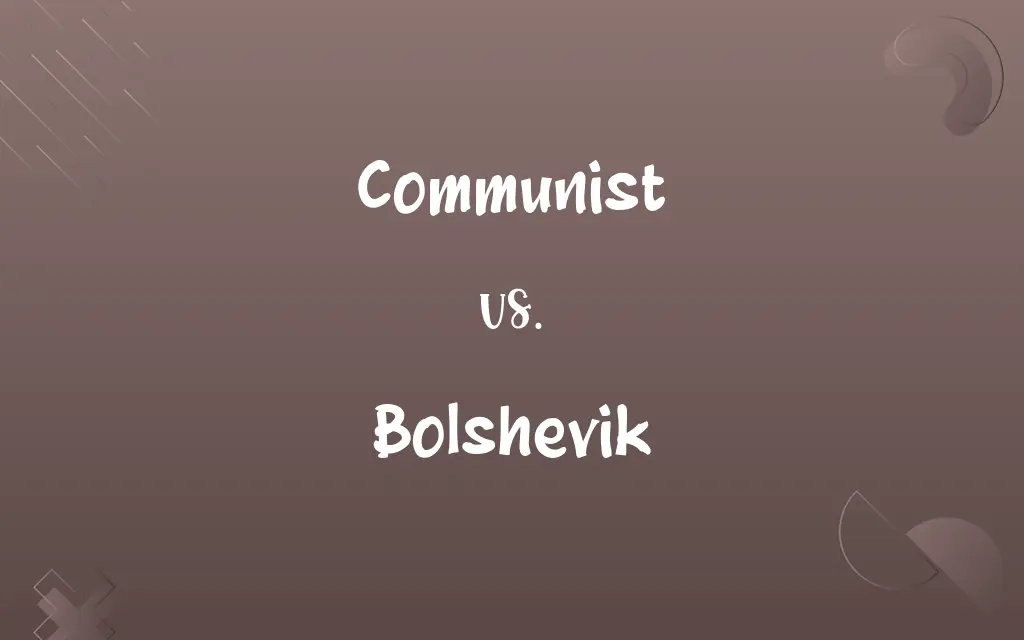Communist vs. Bolshevik: Know the Difference

By Shumaila Saeed & Hifza Nasir || Updated on March 4, 2024
Communism advocates for a classless society and no private property. Bolsheviks, a Russian socialist faction, led the 1917 October Revolution, founding a communist government.

Key Differences
Communism encompasses a wide range of theories and practices aimed at creating a society where all property is publicly owned, and each person works and is paid according to their abilities and needs. The Bolsheviks, on the other hand, were a specific group within the Russian Social Democratic Labour Party (RSDLP) led by Vladimir Lenin.
Shumaila Saeed
Mar 04, 2024
Communism originating from the ideas of Karl Marx and Friedrich Engels, communism seeks to eliminate class distinctions, aiming for a stateless, moneyless, and classless society through various means, including revolution. Bolsheviks distinguished themselves from the Mensheviks (another faction within the RSDLP) through their belief in a smaller, more disciplined party of professional revolutionaries capable of leading a proletarian revolution. The Bolsheviks' successful seizure of power in the October Revolution of 1917 led to the establishment of the Soviet Union, the world's first communist state.
Hifza Nasir
Mar 04, 2024
While communism is a broad concept applied and interpreted in various ways around the globe, the Bolsheviks were instrumental in putting communist theory into practice in a specific historical and geographical context. Their approach to communism emphasized a centralized party structure and the dictatorship of the proletariat as a necessary phase in the transition to a truly communist society.
Shumaila Saeed
Mar 04, 2024
The distinction between communists and Bolsheviks can also be seen in their approaches to achieving their goals. While communists might advocate for various methods ranging from parliamentary participation to revolutionary activity, the Bolsheviks specifically endorsed the idea of a vanguard party leading a proletarian revolution to overthrow capitalism.
Shumaila Saeed
Mar 04, 2024
"Bolshevik" has come to be associated with a particular style of communism characterized by its emphasis on party leadership and revolutionary zeal. This has influenced many communist movements worldwide, though not all communists identify with Bolshevik methods or ideology.
Hifza Nasir
Mar 04, 2024
ADVERTISEMENT
Comparison Chart
Definition
A political and social ideology advocating for a classless society and the abolition of private property.
A faction within the Russian socialist movement that led the October Revolution and established the Soviet Union.
Hifza Nasir
Mar 04, 2024
Origin
Based on the works of Karl Marx and Friedrich Engels.
Emerged from the Russian Social Democratic Labour Party, led by Vladimir Lenin.
Shumaila Saeed
Mar 04, 2024
Goals
Establishment of a stateless, classless, and moneyless society.
Seizure of power through revolution to establish a dictatorship of the proletariat and eventually achieve communism.
Shumaila Saeed
Mar 04, 2024
Means
Varied, including revolution, parliamentary participation, and social reform.
Revolution led by a vanguard party of professional revolutionaries.
Dua Fatima
Mar 04, 2024
Historical Context
A global movement with varying applications in different countries.
Specifically related to the Russian Revolution and the early Soviet state.
Dua Fatima
Mar 04, 2024
ADVERTISEMENT
Influence on Communism
The theoretical foundation for various communist movements.
A practical application of communist theory, influencing the structure and tactics of communist parties worldwide.
Hifza Nasir
Mar 04, 2024
Communist and Bolshevik Definitions
Communist
An ideology aiming for a classless society where property is communally owned.
Communism proposes that wealth should be distributed according to need.
Shumaila Saeed
Mar 04, 2024
Bolshevik
Emphasized a disciplined, central party of professional revolutionaries.
The Bolshevik strategy was centered around a tightly-knit party leading the masses.
Hifza Nasir
Mar 04, 2024
Communist
Based on the theories of Marx and Engels.
The foundations of communism are detailed in Marx's works, including Das Kapital.
Shumaila Saeed
Mar 04, 2024
Bolshevik
A member of the faction of the Russian socialist movement that led the 1917 October Revolution.
Lenin was the leader of the Bolsheviks, who seized power in Russia.
Hifza Nasir
Mar 04, 2024
ADVERTISEMENT
Communist
Seeks to abolish private property to eliminate class struggle.
The communist manifesto calls for the workers of the world to unite.
Hifza Nasir
Mar 04, 2024
Bolshevik
Played a key role in establishing the Soviet Union.
Following their revolution, the Bolsheviks founded the world's first communist state.
Shumaila Saeed
Mar 04, 2024
Communist
Varied interpretations and implementations across the globe.
Communism has been adapted differently in countries like China and Cuba.
Shumaila Saeed
Mar 04, 2024
Bolshevik
Their approach has influenced many communist movements.
Bolshevik tactics and ideology have shaped the strategies of communist parties worldwide.
Dua Fatima
Mar 04, 2024
Communist
Advocates for the workers' control over production and resources.
Communism envisions a society where the proletariat has direct control over the means of production.
Hifza Nasir
Mar 04, 2024
Bolshevik
Advocated for a revolutionary overthrow of the capitalist system.
The Bolsheviks believed in the necessity of a proletarian revolution for societal transformation.
Shumaila Saeed
Mar 04, 2024
Communist
A member of a movement or political party that advocates Communism.
Shumaila Saeed
Oct 19, 2023
Bolshevik
A member of the left-wing majority group of the Russian Social Democratic Workers' Party that adopted Lenin's theses on party organization in 1903.
Shumaila Saeed
Oct 19, 2023
Bolshevik
A member of the Russian Social Democratic Workers' Party that seized power in that country in November 1917.
Shumaila Saeed
Oct 19, 2023
Communist
Often communist A radical viewed as a subversive or revolutionary.
Shumaila Saeed
Oct 19, 2023
Bolshevik
A member of a Marxist-Leninist party or a supporter of one; a Communist.
Shumaila Saeed
Oct 19, 2023
Communist
Often communist Relating to, characteristic of, or held to resemble communism or Communists.
Shumaila Saeed
Oct 19, 2023
Bolshevik
A member of the extreme left wing of the Social Democratic Party that seized power in Russia in 1917 after the Russian October Revolution, and advocated rule by the proletariat and state ownership of property.
Shumaila Saeed
Oct 19, 2023
Communist
Communist Supporting, advocating, or serving to further communism
Communist propaganda.
Shumaila Saeed
Oct 19, 2023
Bolshevik
Anyone with communist leanings or sympathies; - used very loosely in a derogatory sense by some people with economically conservative views.
Shumaila Saeed
Oct 19, 2023
Communist
An advocate of a society based on the common ownership of property; a proponent of communism.
Shumaila Saeed
Oct 19, 2023
Bolshevik
A Russian member of the left-wing majority group that followed Lenin and eventually became the Russian communist party
Shumaila Saeed
Oct 19, 2023
Repeatedly Asked Queries
Do Bolsheviks still exist today?
The term "Bolshevik" is historically specific, but its principles influence some contemporary communist and socialist organizations.
Shumaila Saeed
Mar 04, 2024
Can all communists be considered Bolsheviks?
No, not all communists are Bolsheviks. Bolsheviks refer specifically to members of the faction led by Lenin that seized power in Russia in 1917.
Shumaila Saeed
Mar 04, 2024
How did Bolsheviks view the role of the state?
Bolsheviks believed in the dictatorship of the proletariat as a transitional phase towards a stateless, classless society.
Shumaila Saeed
Mar 04, 2024
Were Bolsheviks the only group fighting for communism in Russia?
No, the Bolsheviks were one of several factions within the Russian socialist movement, but they were the ones who successfully led the October Revolution.
Hifza Nasir
Mar 04, 2024
Is communism inherently revolutionary?
While many communist theories advocate for revolutionary change, the approach to achieving a communist society can vary, including peaceful reform or parliamentary participation in some interpretations.
Hifza Nasir
Mar 04, 2024
Why did some communists oppose the Bolsheviks?
Some communists opposed the Bolsheviks due to disagreements over strategy, tactics, and the interpretation of Marxist theory, particularly regarding the role of the vanguard party and the pace of revolutionary change.
Dua Fatima
Mar 04, 2024
What happened to the Bolsheviks after the Russian Revolution?
After the revolution, the Bolsheviks consolidated power, reorganizing into the Communist Party of the Soviet Union, which governed until the country's dissolution in 1991.
Hifza Nasir
Mar 04, 2024
What is the main difference between communists and Bolsheviks?
Communism is a broad ideology seeking a classless society, while Bolsheviks were a specific group within the Russian socialist movement that implemented communist ideas through the October Revolution.
Hifza Nasir
Mar 04, 2024
How do modern interpretations of communism view the Bolsheviks?
Modern interpretations vary, with some viewing the Bolsheviks as a model for revolutionary action, while others critique their methods and governance as authoritarian.
Shumaila Saeed
Mar 04, 2024
How did communism differ in other countries compared to the Soviet Union?
Communist implementations vary significantly, with each country adapting the ideology to its unique circumstances, leading to differences in governance, economic policies, and social structures.
Hifza Nasir
Mar 04, 2024
Share this page
Link for your blog / website
HTML
Link to share via messenger
About Author
Written by
Shumaila SaeedShumaila Saeed, an expert content creator with 6 years of experience, specializes in distilling complex topics into easily digestible comparisons, shining a light on the nuances that both inform and educate readers with clarity and accuracy.
Co-written by
Hifza Nasir








































































